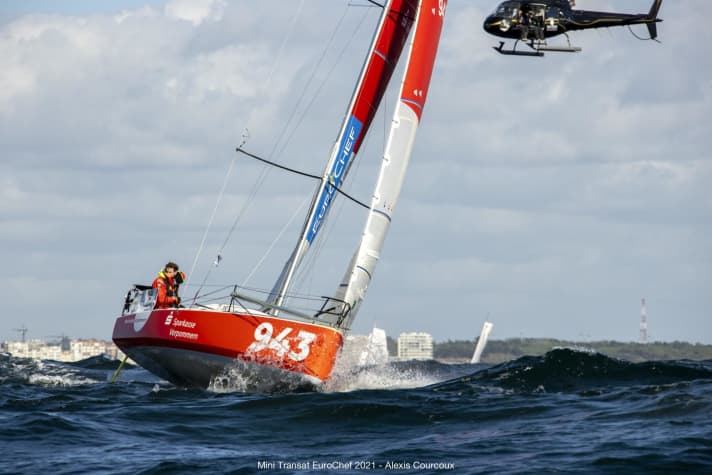On Friday at 4 pm: Start of the 2nd stage of the Mini-Transat: "Anything is possible!"
Tatjana Pokorny
· 28.10.2021
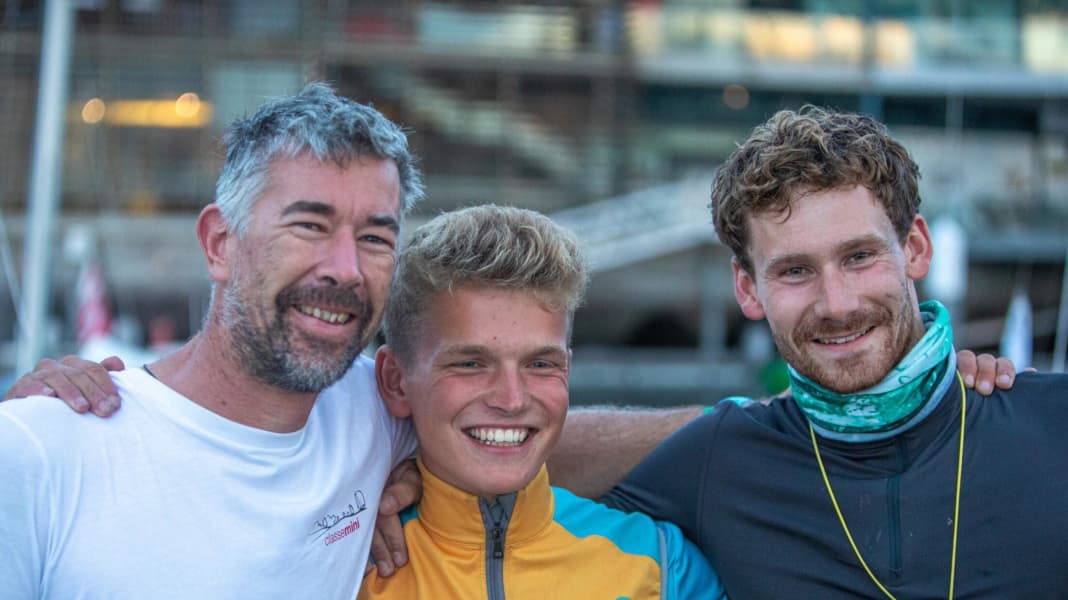
The starting signal will be given on Friday at 4 pm German time: 63 production boat helmsmen and 24 proto-skippers will set off on the second and decisive leg of the Mini-Transat EuroChef 2021. Instead of the 1350 nautical miles of the first leg, the aim now is to complete around 2700 nautical miles in the best possible way with the jump across the pond. Many of the mini racers are looking forward to their premiere. These include stage winner Melwin Fink and stage ninth Lennart Burke in the series field. Both can and want to fight for a strong top ten position. Just like the Austrian Christian Kargl, who finished second after stage one. The German-speaking trio also has a chance of finishing on the podium. "Anything is possible!" said Christian Kargl after the long stage briefing on Thursday evening in Santa Cruz de La Palma.
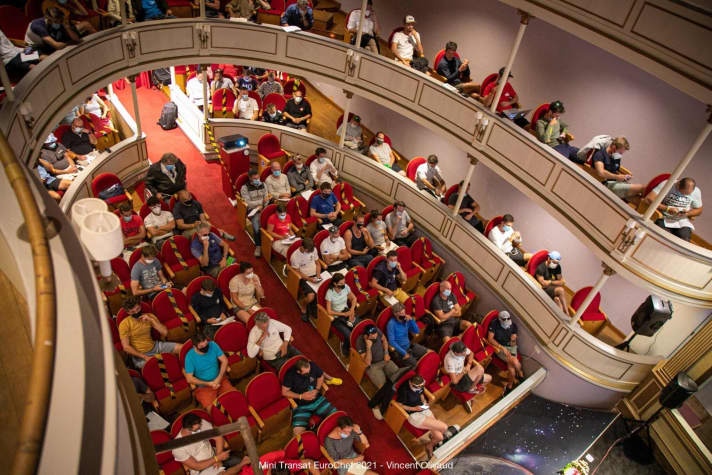
To be on the safe side, most mini travellers have provisions for up to 20 days with them, but the faster ones are more likely to take 15 to 18 days. The daredevils have two waypoints to consider on their course from Santa Cruz de La Palma on the Canary Islands to Saint-François on Guadeloupe: The small Canary Island of El Hierro is left to starboard, as is the virtual waypoint of 30 degrees west, 25 degrees north. After that, the Atlantic challengers in their small boats are free to choose their course almost all the way to the finish.
"The strategic tasks are interesting: on one side there is a kind of acceleration zone off the African coast, on the other side the high pressure area pushes in. This bends the track very nicely. You can go in and out at a nice angle," enthuses meteorology expert Christian Kargl. He is relying on his experience and "my composure" for the upcoming task and has set his sights high: "Full throttle, of course! I know that there are faster mini sailors, but it's probably my last big mini race... So I'll try to sleep little and steer a lot. I need about four and a half to five and a half hours of sleep a day. My big plan is to take every wind shift and rain cloud in my stride."
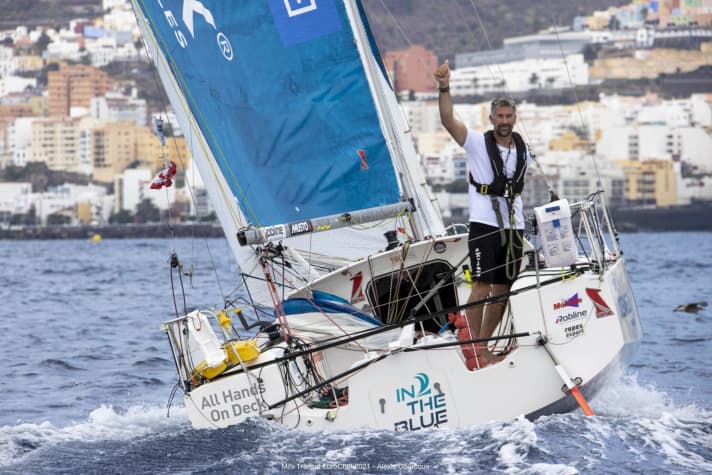
With congratulations from Jean Le Cam and Boris Herrmann in stage two
SignForCom skipper Melwin Fink is also well prepared for his transatlantic premiere. The fact that the large lead he had built up on the water has dwindled to just under two hours ahead of his nearest rival as a result of the flood of protests does not change his plan: "Crossing the Atlantic for the first time is a big board for me. I'm going to focus on myself again, sail my own race and not put too much pressure on myself. The first leg was mega. My first goal is still to finish. Then I would have already achieved something really big. It's clear that I want to achieve the best possible place."
The youngest participant in the entire fleet, whose performance was significantly diminished as a result of the mass compensation for the competition after their storm stops, has received a lot of support in recent weeks. Boris Herrmann and Jörg Riechers have congratulated him. And "King" Jean Le Cam and the Swiss Vendée-Globe-Benjamin Alan Roura, who has just taken over the former "Hugo Boss" from Alex Thomson, also personally showed their respect for the young German. "Today I had an interview with a Parisian newspaper. They sent me special greetings from the Imoca class association and the designer Manuard, who are delighted for me," said Fink on the evening before the start, which he enjoyed over a last pizza.
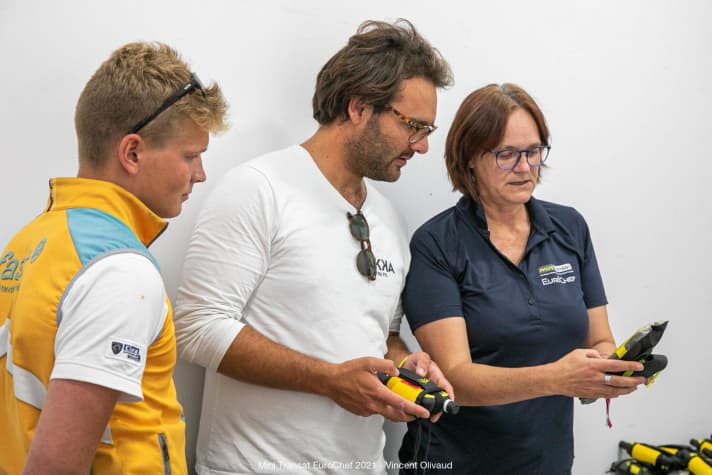
"If you're overtaken by an Ultime, you have to buy a beer"
In the last few days before the start, Fink also joked with some mini sailors about whether the fastest boats in the Transat Jacques Vabre, which doesn't start until 7 November, will be able to catch up with the minis. "Probably the Ultimes at most," says Fink with a grin. "We've said that anyone who is overtaken by an Ultime will have to buy a beer." Fink's small workshop van with its own workbench and equipment, which the driver of a sponsor had kindly brought to the Canary Islands, was increasingly popular and highly frequented in the stage harbour of Santa Cruz de La Palma: "Many French people were also happy about that," says Fink. "I had everything I could have needed with me, but fortunately I hardly needed it myself. But it's nice to be able to help."
Rixgens struggles with loose keel bomb
24 hours before the start of the second leg, "Avanade" proto-skipper Lina Rixgens had to help herself when she made another nasty discovery during a dive on Thursday after suffering double rudder damage on leg one: "I realised today that my keel bomb was loose." She immediately followed up her shock with action. By the evening, she was a little more confident about the start on Friday afternoon: "We're on it. It could work out." Marc Siewert, who is in 24th place in the proto rankings in only the second solo regatta of his life, wants to improve on this second stage.
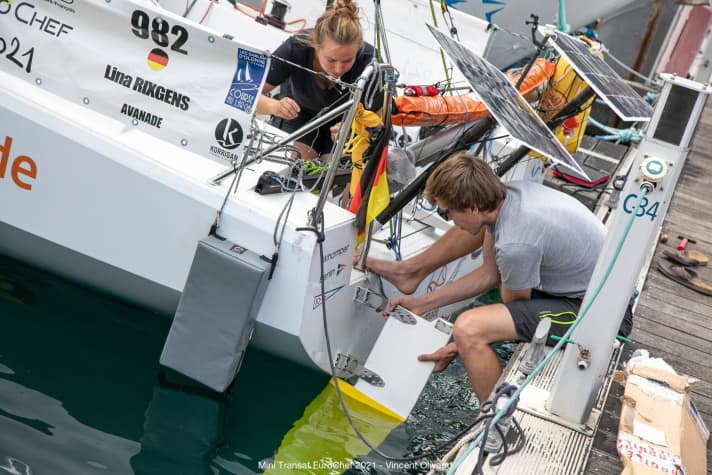
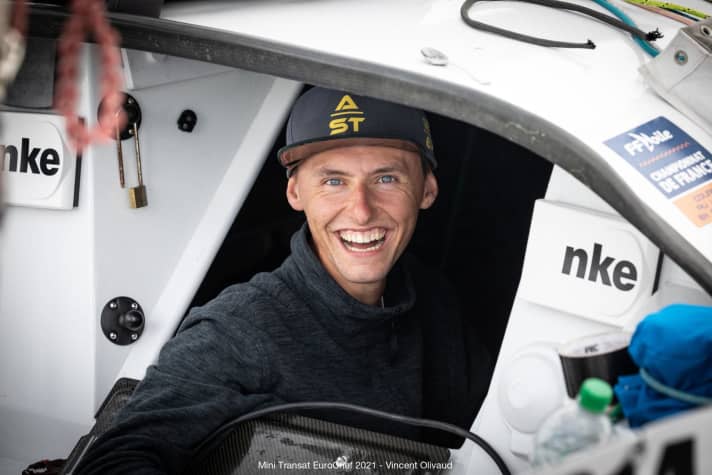
Series boat skipper Lennart Burke is starting the second leg with better prospects: "My starting position is very good for my goal of sailing into the top ten. It would be extremely cool if I could finish sixth or seventh. But it will be tough. There are still a few people behind me who could just as easily be ahead of me." Like Fink, Burke sails a Pogo 3, a boat known for its good performance in lighter winds, which are expected for long stretches of the transatlantic leg. "At least the maxis are not at an advantage," says Burke. His outlook for the upcoming race: "It's going to be exciting! And it will be very challenging at the start, because it will be about who can pull away. Whoever succeeds in doing that will also be at the front. That's why a good start is extremely important, but not at all easy, because there tends to be less and less wind around the Canary Islands." The live broadcast of the start begins at 3.50 pm on the organisers' Facebook page (please click!)
